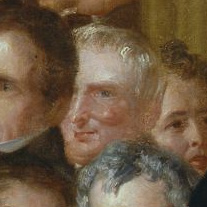Joseph Pease (India reformer)
[4] He made his name as an Indian reformer, and his branch of the family supported abolitionism in the form given to it by William Lloyd Garrison.
[2] During the 1830s he became active in involving others in "India reform", which meant here commercial solutions to driving out the use of slaves in commodity production, as well as the abolition of Indian slavery.
[6] The British India Society (BIS) founded in 1839 was short-lived, not surviving in activity beyond 1843, but Pease was a central figure in it.
Its direction, further than support of Garrison, was to promote cotton production in India, seek allies among moderate Chartists, and oppose the divisive evangelical slant represented by the Boston Female Anti-Slavery Society (BFASS).
[7] At the World Anti-Slavery Convention of 1840, Pease spoke and accused the British government of being complicit in the continuing existence of slavery in India.
[10] Pease and Thompson put emphasis on the BIS as an ally of the Anti-Cornlaw League, and free trade.
